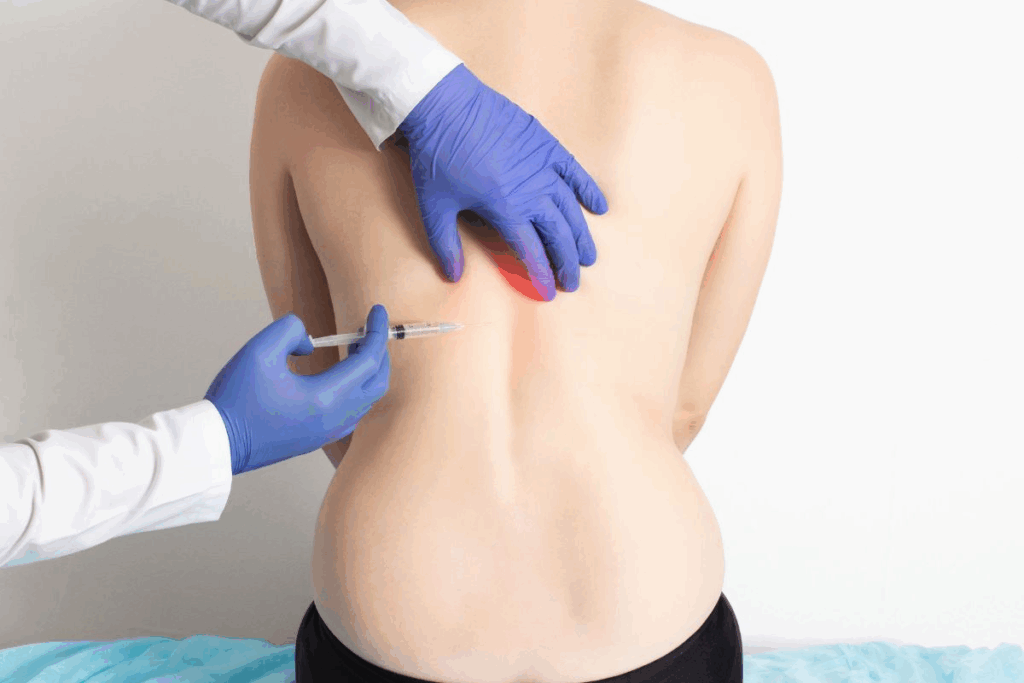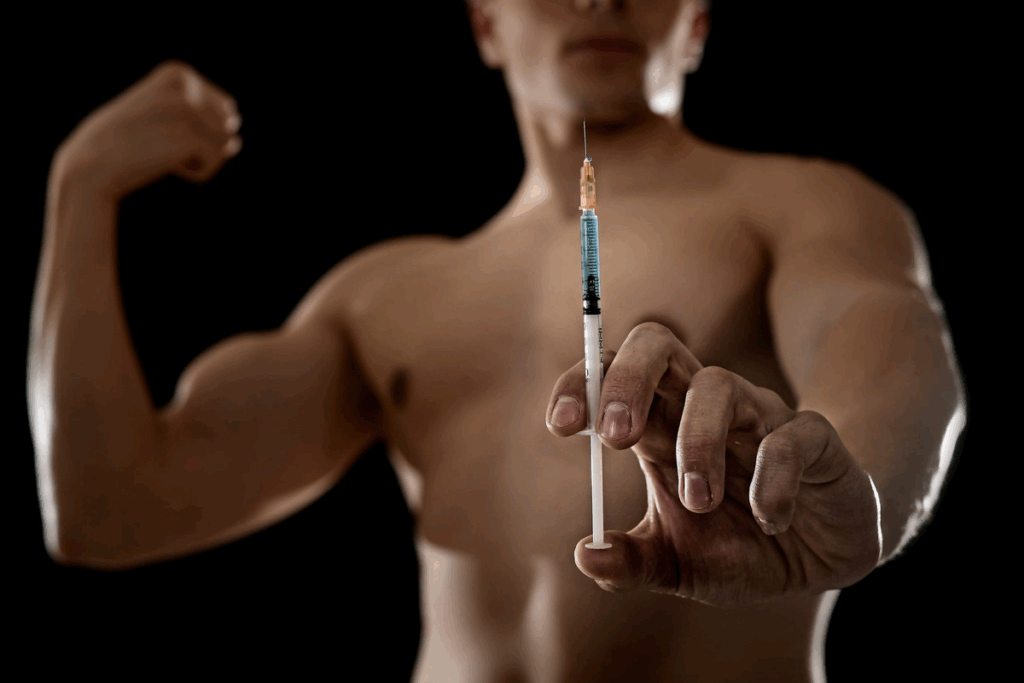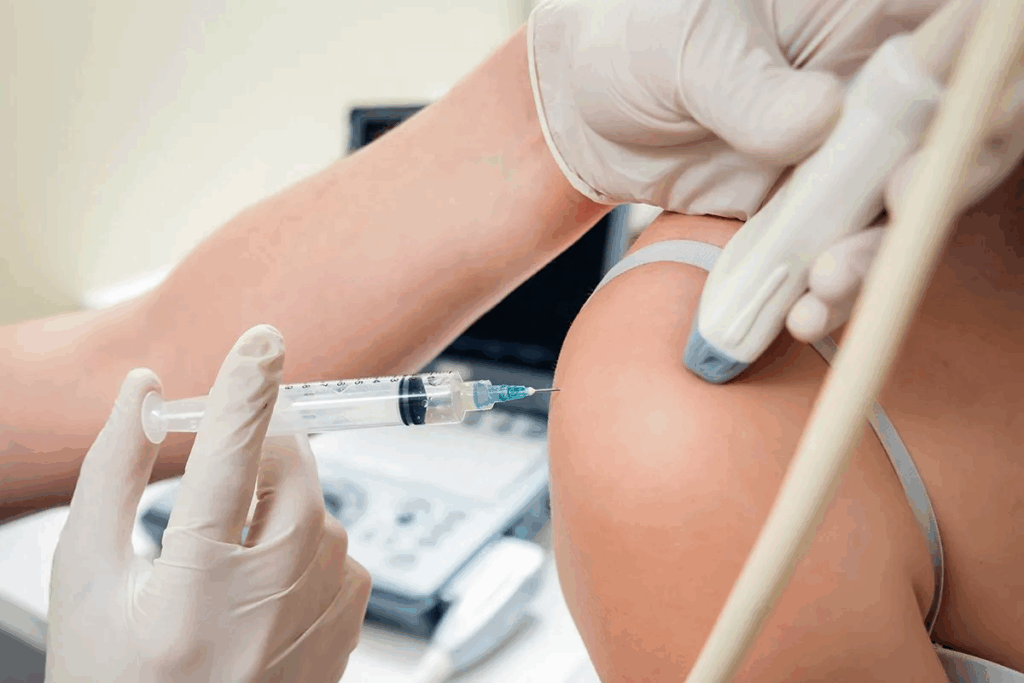Last Updated on October 23, 2025 by mcelik

At Liv Hospital, we know patients with cortisone shots often ask how long does it take a steroid injection to work, when they’ll feel better, and if it’s okay to drink alcohol. Steroid injections, like cortisone shots, help with pain and swelling. They’re used for many conditions.
Most people start feeling better within 48 to 72 hours after a steroid injection. Over 90 percent see relief in a week. But it’s important to follow certain rules after getting a cortisone shot. This helps you get the most pain relief and avoids problems.

Patients need to understand the role of steroid injections. These injections, also known as corticosteroid injections, help reduce inflammation and pain in different parts of the body.
Corticosteroid injections are a type of medication. They are given directly into the affected area to lessen inflammation and swelling. “Corticosteroids are not the same as anabolic steroids used by some athletes”; they mimic the body’s natural cortisol hormone.
There are several types of corticosteroid injections:
Each type is used for specific conditions and has a different action time. The choice depends on the condition and the patient’s medical history.
Steroid injections treat many conditions, including:
Medical experts say that
“Steroid injections can provide significant relief for patients suffering from these conditions, improving their quality of life.”

Patients often wonder how long it takes for a steroid injection to work. We know it’s important to manage their expectations well.
Right after the injection, some relief is felt due to the local anesthetic. This relief is temporary and lasts a few hours.
Most people see a big improvement in 48 to 72 hours. The steroid’s anti-inflammatory effects kick in, bringing noticeable pain relief.
While some feel better quickly, the full effects can take up to one week. It’s key for patients to know this to set realistic expectations.
Knowing when relief will come is key to patient happiness. We tell patients to:
By understanding the steroid injection timeline, patients can better manage their treatment. This helps them get the best results.
Many things can change how fast steroid injections work. Knowing these can help both patients and doctors get better results.
The kind of corticosteroid in the injection matters a lot. Each steroid is different in strength and how long it lasts. For example, triamcinolone and methylprednisolone are two common ones, each with its own traits.
| Corticosteroid | Potency | Duration of Action |
| Triamcinolone | High | Several weeks |
| Methylprednisolone | Medium to High | Several weeks |
Where and how the injection is given is very important. Shots given right where it hurts work better and faster. The doctor’s skill also matters a lot.
How bad the inflammation is can also affect the injections. If it’s really bad, you might need stronger steroids or more of them.
Things like your health, any chronic conditions, and how you react to steroids can also play a part. For instance, people with diabetes might see their blood sugar change after getting shots.
Doctors can make treatment plans that fit each patient better. This way, steroid injections can work their best.
Knowing how long pain relief from steroid injections lasts is key. It helps manage what patients expect. The time relief lasts can change a lot, based on the steroid type, the condition, and the patient.
Relief from steroid injections can last weeks to six months. Usually, patients see benefits for 6 weeks to 6 months. This range comes from how different people react to the steroid and their condition.
The time relief lasts can also depend on the condition. For example:
It’s important to remember that the effects of steroid injections won’t last forever. The rate at which benefits fade can differ. Some may need more injections to keep feeling better.
How often you need more injections depends on your condition and how you react to the first one. Usually, injections are repeated every 3-6 months. But this should be decided by a healthcare professional for each person.
Understanding how long pain relief from steroid injections lasts helps patients. It lets them manage their hopes and work with doctors to find the best treatment.
Steroid injections are a key treatment for many medical issues. They help people with chronic pain and swelling. These injections target the problem areas, giving relief.
Corticosteroid injections are used for arthritis and joint problems. They cut down swelling and pain. This improves how well joints work and boosts patients’ quality of life.
For example, people with osteoarthritis get a lot of pain relief. This lets them move more easily. Those with rheumatoid arthritis see less joint swelling and pain during flare-ups.
While not a direct treatment for flu and colds, steroid injections can help with complications. They can reduce swelling in the sinuses or nasal passages.
Steroid injections are also used for back pain and sciatica. They are injected around the spinal cord. This reduces swelling and pressure on the sciatic nerve, easing pain.
This method is great for people with herniated discs or spinal stenosis. It helps them move better and do more things.
Athletes get steroid injections for sports injuries like tendinitis or bursitis. These injections cut down swelling and pain. This helps athletes get back to their sports faster.
For instance, tennis elbow or golfer’s elbow can be treated with these injections. Athletes can keep training and competing without long breaks.
The table below shows how steroid injections are used for different conditions:
| Condition | Treatment Goal | Benefits |
| Arthritis | Reduce joint inflammation and pain | Improved joint function, reduced pain |
| Back Pain and Sciatica | Relieve pressure on the sciatic nerve | Pain relief, improved mobility |
| Sports Injuries (Tendinitis, Bursitis) | Reduce inflammation and pain | Quicker recovery, reduced downtime |
Steroid injections are effective in reducing pain. They work by affecting several biological processes. These injections, mainly corticosteroids, target the root causes of pain and inflammation.
Corticosteroid injections reduce inflammation at the injection site. They do this by lowering the body’s inflammatory chemicals. This decrease in inflammation leads to less pain and better function.
Another way steroid injections work is by modulating the immune system. Corticosteroids reduce the body’s inflammatory response, which causes pain. This helps in healing and reduces discomfort.
Steroid injections can have both local and systemic effects. Local effects are what we want, directly reducing inflammation at the site. But systemic effects can happen, affecting the body more widely.
It’s important to know the difference between therapeutic and performance-enhancing steroids. Therapeutic steroids treat medical conditions and are used under a doctor’s care. Anabolic steroids, on the other hand, are misused to boost athletic performance and are not for medical use.
| Characteristics | Therapeutic Corticosteroids | Performance-Enhancing Anabolic Steroids |
| Purpose | Treat medical conditions, reduce inflammation | Enhance athletic performance, muscle growth |
| Administration | Medical supervision, localized injections | Often self-administered, oral or injectable |
| Effects | Anti-inflammatory, pain relief | Muscle growth, enhanced performance |
It’s important to know how alcohol and medications interact. Drinking alcohol while on medication can change how well the medication works. It can also increase the chance of side effects.
Alcohol can change how medications are absorbed. Drinking alcohol can speed up or slow down how fast medications get into the blood. This can make the medication work differently or cause more side effects.
For example, alcohol can:
The liver is key in breaking down both alcohol and medications. When we drink alcohol, the liver focuses on it first. This can affect how medications are processed.
This can lead to:
Even though a little drinking doesn’t usually mess with corticosteroids, it’s smart to follow some rules. This is true when drinking alcohol with medications.
Some important things to remember are:
By understanding these basics, we can handle the risks of mixing alcohol and medications better.
It’s important to know how alcohol affects you after a cortisone shot. These shots are used to treat inflammation. Many patients wonder about their lifestyle choices after getting one.
Doctors usually tell patients to be careful with alcohol after a cortisone shot. Drinking in moderation might not harm the shot’s effect. But both alcohol and cortisone can affect your immune system and liver.
It’s key to think about how alcohol and steroid shots might interact. Alcohol can change how your body reacts to medication. This can sometimes cause bad side effects.
There’s not much research on alcohol and cortisone interactions. But studies show both can harm your immune system and liver.
| Substance | Effect on the Immune System | Effect on Liver |
| Corticosteroids | Suppresses immune response | Can cause changes in liver function |
| Alcohol | It can weaken the immune system | It can cause liver damage with excessive consumption |
When you can drink alcohol after a cortisone shot depends on several things. This includes the type of steroid and your health.
Doctors usually say to wait 48 to 72 hours before drinking. But your doctor’s advice is the best guide.
It’s important to know the difference between moderate and heavy drinking after a cortisone shot. Moderate drinking is up to one drink a day for women and two for men.
Heavy drinking can worsen the side effects of cortisone shots. Be aware of the dangers of heavy drinking during treatment.
Drinking alcohol after getting steroid injections can be risky. People get these injections to ease pain and swelling. But adding alcohol to their system can make things worse.
Steroid injections help by reducing swelling. But drinking alcohol can weaken the immune system even more. This makes it harder for the body to fight off infections.
Studies show that long-term drinking harms the immune system. Mixing this with steroid injections can make things worse. It increases the risk of serious problems.
The liver deals with both steroids and alcohol. Using both can strain the liver and might damage it over time. People with liver issues need to be extra careful.
It’s wise for patients to talk to their doctor about their liver before drinking after injections. They might need to watch their liver health closely if they do drink.
Steroid injections aim to reduce swelling and help with healing. But alcohol can slow down healing. Long-term drinking can hinder the body’s repair process, reducing the steroid’s benefits.
Also, alcohol can cause swelling in some areas, which can undo the steroid’s effects. This shows why patients should be careful with alcohol after injections.
Drinking alcohol with steroid injections can lead to more side effects. These can range from mild to serious health issues. Patients should know the risks of mixing alcohol with injections.
We suggest patients think carefully about drinking after injections. Talking to a healthcare provider can help them make the best choice for their health.
When we talk about steroid injections, we must think about different patient groups. Each group has its own needs and health status. This ensures we give the best care possible.
Patients with chronic conditions, like diabetes or hypertension, need careful management with steroid injections. We must watch their condition closely. This is because steroid injections can make health issues worse.
For example, corticosteroids can change blood sugar levels. This means we might need to adjust how we manage diabetes.
Older adults might be more at risk for side effects from steroid injections. This is because their immune function may be weaker, a nd they might have other health issues. We need to look at their overall health, including any age-related changes.
This might mean adjusting the dosage or how often we give the injections.
Athletes and active people often get steroid injections to help with pain and inflammation from sports injuries. We need to think about their specific needs. This includes the type of sport, how active they are, and their rehab plans.
It’s important to give them guidance on what to do after the injection and how to get back to their activities safely.
For patients who have used alcohol before, we need to think about the risks of mixing alcohol with steroid injections. We should check their liver health and watch for any increased side effects. It’s key to advise them on safe drinking levels and keep a close eye on their health.
By focusing on these special patient groups and tailoring our approach, we can make steroid injections safer and more effective for everyone.
We’ve looked into how steroid injections, like cortisone shots, help with pain. They’re often used to reduce swelling and ease pain from arthritis, back issues, and sports injuries.
It’s important to know how alcohol might affect steroid injections. Drinking in moderation usually doesn’t harm their effectiveness. But it’s key to remember the risks, like how it might affect your immune system and liver.
To stay safe, patients should follow advice on drinking after a steroid shot. Knowing how these injections work and being careful with alcohol helps. This way, patients can make smart choices about their care and avoid risks.
A cortisone shot is a type of injection that helps reduce inflammation and pain. It works by calming down the immune system and lowering inflammation.
There’s no clear answer, but it’s best to avoid or limit alcohol after a cortisone shot. Alcohol might interact with the medication and affect how your liver works.
It’s wise to wait a few days to a week before drinking alcohol. The exact time depends on your situation and the medication used.
Mixing alcohol with steroid injections can increase side effects. It might also harm your immune system and liver health.
Athletes and those with sports injuries should be careful with alcohol after a steroid injection. It could slow down healing and interact with the medication.
It usually takes 48-72 hours for a steroid injection to start working. Full effects are seen within a week.
Those with back pain should avoid or limit alcohol after a steroid injection. This helps avoid risks.
Older adults need to be extra careful with steroid injections. They might be more likely to experience side effects and interactions with alcohol and other medications.
People with a history of alcohol use should talk to their doctor before drinking after a steroid injection. They might be at higher risk for bad interactions.
Pain relief from a steroid injection can last weeks to months. It depends on the condition and individual factors.
Kamel, S. I., et al. (2024). Local and systemic side effects of corticosteroid injections. American Journal of Roentgenology. National Center for Biotechnology Information. https://pubmed.ncbi.nlm.nih.gov/38117096/
Subscribe to our e-newsletter to stay informed about the latest innovations in the world of health and exclusive offers!
WhatsApp us